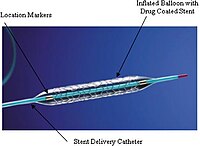
Photo from wikipedia
Magnesium alloy is generally accepted as a potential cardiovascular stent material due to its good mechanical properties, biocompatibility, and biodegradability, and has become one of the research hotspots in this… Click to show full abstract
Magnesium alloy is generally accepted as a potential cardiovascular stent material due to its good mechanical properties, biocompatibility, and biodegradability, and has become one of the research hotspots in this field. However, too fast degradation rate and delayed surface endothelialization have been the bottleneck of further application of magnesium alloy stent. In this study, we selected Mg–Zn–Y–Nd, a kind of biodegradable magnesium alloy for cardiovascular stent, and passivated its surface by alkali heat treatment and silane treatment to improve the corrosion resistance, subsequently conjugated Arg–Glu–Asp–Val (REDV) peptide and anti-CD34 to promote endothelial cells adhesion and capture endothelial progenitor cells respectively, further improving surface endothelialization. In addition, the heparin was also immobilized to the Mg–Zn–Y–Nd surface for the consideration of anti-coagulation and anti-inflammation. Systematic material characterization and biological evaluation show that we have successfully developed this composite surface on Mg–Zn–Y–Nd alloy, and achieved multiple functions such as corrosion resistance, promoting endothelialization, and inhibiting platelet/macrophage adhesion.
Journal Title: Journal of Biomaterials Applications
Year Published: 2020
Link to full text (if available)
Share on Social Media: Sign Up to like & get
recommendations!